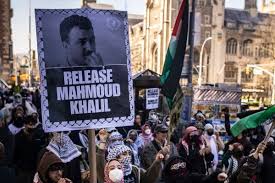In a recent development, federal Judge Michael Farbiarz ordered the release of anti-Israel activist Mahmoud Khalil on bail, citing "extraordinary circumstances" in his case. This decision was made during a hearing in New Jersey, where Judge Farbiarz determined that Khalil was neither a flight risk nor a danger to the community, deeming his detention as "highly unusual." Khalil, a lawful permanent resident, had been detained for three months after his arrest in March at his apartment at Columbia University, where he is a student. His release, eagerly anticipated by many, could materialize as soon as Friday.
The initial arrest of Khalil had sparked a series of legal battles, as an immigration judge found him removable based on a memo from Secretary of State Marco Rubio, which contended that Khalil's activism on campus clashed with U.S. foreign policy interests. However, Farbiarz later prohibited the Secretary from using that determination to deport Khalil. The Department of Homeland Security cDHSc then introduced a separate rationale for detaining him, alleging that Khalil had omitted crucial information from his green card application related to his affiliations with organizations like the Columbia University Apartheid Divest.
This case has become a focal point for supporters of Khalil, including anti-Israel protesters and immigration rights advocates. They argue that the charges against Khalil are a form of retaliation by the Trump administration for his opposition to Israeli policies and that they encroach on free speech rights. The administration, on the other hand, has contended that aside from the green card application issue, Khalil's activism signals support for the terrorist group Hamas, violating immigration laws.
With Khalil's release ordered by the federal judge, a sense of relief has washed over his family and supporters who have been vocal in their calls for his release. His wife, Noor Abdalla, expressed gratitude for the ruling while acknowledging that it does not entirely address the injustices her family has faced. She emphasized the importance of advocating for Palestinian rights amidst challenging circumstances.
The legal proceedings surrounding Khalil's case have stirred debates about free speech protections, national security concerns, and the extent of executive branch powers in immigration matters. As the narrative unfolds, it underscores the complex intersection of activism, immigration policy, and constitutional rights in the contemporary landscape.
In response to Judge Farbiarz's ruling, government attorney Dhruman Sampat argued that Congress has granted broad powers to the executive branch in determining deportations. However, Judge Farbiarz pushed back, asserting the authority of the court in such matters and emphasizing Khalil's lack of flight risk or threat to public safety.
The ongoing saga of Mahmoud Khalil serves as a poignant reminder of the challenges faced by individuals caught in the crossfire of political tensions and legal battles. It highlights the importance of upholding due process, protecting civil liberties, and ensuring a fair and just legal system for all individuals, regardless of their background or beliefs. The implications of this case reverberate beyond the confines of immigration law, sparking conversations around free expression, national security, and the boundaries of governmental authority.
As the situation continues to evolve, it remains to be seen how Khalil's case will shape the discourse on immigration enforcement, activism, and constitutional rights in the United States. For now, his impending release marks a significant milestone in a legal battle that has garnered widespread attention and ignited impassioned debates on key issues at the intersection of law, politics, and individual freedoms.

